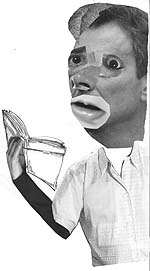|
Tuesday,
November 20, 2001
Too
tired to sleep
Lack
of sleep results in students suffering in studies and health
By
Erin LaMourie
Staff Reporter
Illustrations by Nick McPherson
Lights
off. Total silence. Staring at the computer with eyes barely
open.
It’s
almost 2 a.m., and Amber Sutor still has many physics problems
to finish. Her roommate has been asleep for hours and her
own bed is now tempting her, but she knows she must stay awake
and finish her homework. She has no choice. She either stays
up late finishing it, or falls behind in her classes.
Sutor,
a sophomore chemistry major, sacrifices hours of sleep night
after night just trying to make the most of every minute of
her time. With barely enough hours in the day to get things
done, her only choice is to sacrifice sleep.
Many
students on campus are stuck in the same pattern, struggling
with sleeplessness and trying to remain awake, with no idea
how it is affecting their bodies.
Dr. Kristyna
Hartse, associate director of Sleep Consultants at 909 8th
Ave., said she often sees student patients who are not getting
enough sleep because of the academic pressures of college.
“A
lot of times we think of sleep as nothing too important in
our life when in fact it can affect everything we do during
the day,” she said.
 Hartse
said sleep disorders like insomnia, the inability to sleep,
can affect about one third of the population at some point
in their life. But most students simply suffer from unhealthy
sleeping habits and not sleep disorders, she said. Hartse
said sleep disorders like insomnia, the inability to sleep,
can affect about one third of the population at some point
in their life. But most students simply suffer from unhealthy
sleeping habits and not sleep disorders, she said.
“The
best thing is to keep a regular time of going to bed at night
and getting up in the morning,” she said. “Keeping
a regular schedule is very important.”
Hartse
said a lack of sleep can cause poor concentration, poor memory,
inability to focus, irritability and sleepiness.
“Sleepiness,
sounds like a common sense side effect, but many people wonder
why they are so sleepy because they are getting five or six
hours of sleep at night,” she said. “But that is
probably not enough sleep.”
Hartse
said people usually need about seven to nine hours each night.
Constant lack of sleep may cause health problems, she said.
“If
day after day they still feel exhausted, or if they have other
symptoms like snoring or bed covers are all torn up (when
they awake), then they probably should talk to a doctor,”
she said.
Sutor
said on a good night she gets about six hours of sleep, but
usually it is closer to three hours.
When
the alarm rings in the morning, she is always sound asleep
but somehow manages to make it out of bed. It is a constant
battle to stay awake despite her many activities during the
day.
“I
try to stay awake in classes,” she said. “But I
can tell I don’t because my notes get smaller and smaller
and I find myself unable to read things.
“It
is no fun to be tired in class,” Sutor said. “(Students)
make stupid mistakes and don’t know what they are doing.”
Michael
Dodson, a political science professor, said he tries to have
constant activity in class to keep students alert.
Dodson
said unless a student sleeps in class frequently, he will
let the student continue to sleep. If a student does sleep
in class often, he will begin to call on the student or stand
by the student which usually keeps the student awake.
Candice
Ditto, freshman interior design major, said she finishes her
studies in the afternoon, but usually stays up late anyway.
“There
are better things to do than sleep,” Ditto said.
Ditto
said she spends time with friends and talking online. She
manages to stay awake in classes with help from coffee and
frequent naps between classes.
Hartse
said if you need to miss sleep, it is important to catch up
as soon as possible.
“The
best thing to do is try to stick to a very regular time of
going to bed and getting up, and to do that sometimes taking
a brief naps during the day can help,” she said.
Sutor
said she usually stays awake during the day by fidgeting and
always keeping busy. She is able to make it through most days,
but sometimes needs to give in and nap.
Without
naps, Sutor knows she would not be able to catch up on missed
sleep. She usually tries to catch up on weekends, but with
church and other activities she often needs to wake up early.
As a
substitute for sleep, some students turn to caffeine or other
stimulants to stay awake.
Sometimes
Sutor uses caffeine but usually can keep awake by studying
in a well-lit room. She forces herself to stay awake because
of the pressure of grades and the need to finish assignments.
However,
Hartse said using these substances forces your body to stay
awake and is usually not a good idea.
“They
will cause you be to alert, but it is probably not a wise
idea,” she said. “They are not going to make you
more productive, but they are going to keep you awake.”
Sutor
said teachers do not realize the amount of time it takes to
complete homework.
“(Teachers) feel all students time is focused on their
class and don’t seem to realize (students) have many
other classes,” she said.
Sutor’s
assignments usually need to be turned in for a grade, so she
often doesn’t have the luxury of completing homework
another night.
Dodson
said he tries to assign homework as fairly as possible, knowing
many of his students are involved in extracurricular activities
and have part-time jobs.
“I
think professors have an obligation to give students work
to do outside of class,” he said. “I can’t
expect students to spend all their time on my class.”
Sutor
said though she stays up late, she knows when to call it quits.
“At
some point, I just realize that nothing is making sense,”
she said. “That is when I go to bed.”
Erin LaMourie
e.m.lamourie@student.tcu.edu
|



 Hartse
said sleep disorders like insomnia, the inability to sleep,
can affect about one third of the population at some point
in their life. But most students simply suffer from unhealthy
sleeping habits and not sleep disorders, she said.
Hartse
said sleep disorders like insomnia, the inability to sleep,
can affect about one third of the population at some point
in their life. But most students simply suffer from unhealthy
sleeping habits and not sleep disorders, she said.